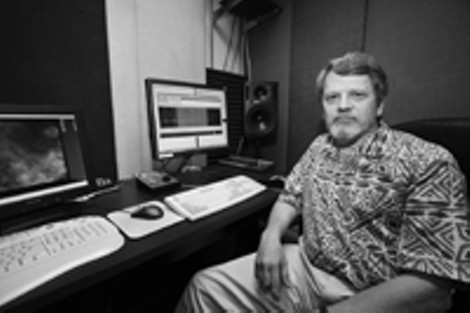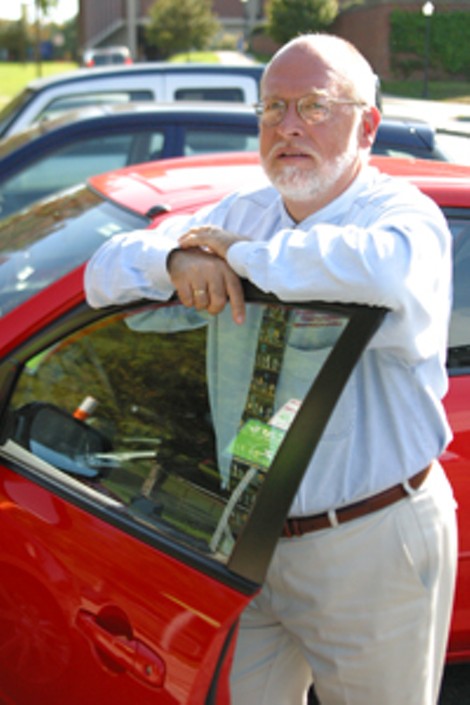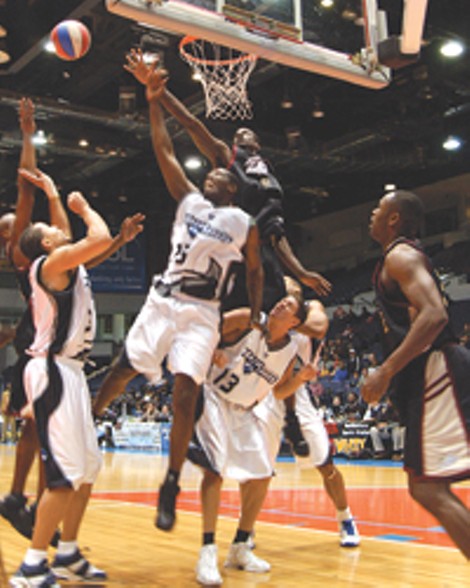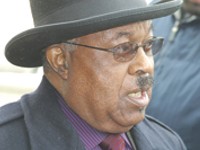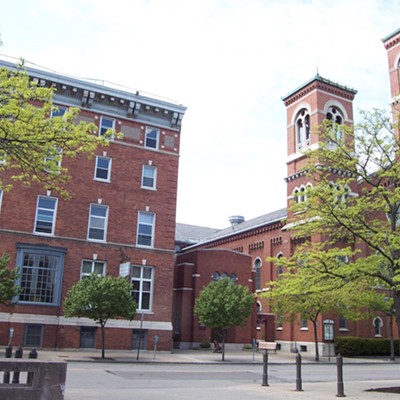Metro ink - 10-11-06
[
{
"name": "500x250 Ad",
"insertPoint": "5",
"component": "15667920",
"parentWrapperClass": "",
"requiredCountToDisplay": "1"
}
]
A COMPUTER-MUSIC MILESTONE
Murray Hill, New Jersey, 1965: Max Matthews makes the first computer generated sounds.
"They were fairly primitive beeps and boops," explains Allan Schindler, director of EastmanComputerMusicCenter, "sounds that were not really sophisticated."
The EastmanSchool established its computer music program in 1981, and ECMC will celebrate its 25th anniversary with a free concert at 8 p.m. Thursday, October 12, at Kilbourn Hall. Performers will include computer music revolutionary Jean-Claude Risset, guest saxophonist David Demsey, and ECMC students.
"Our first computer was about the size of a really large refrigerator," Schindler says. "Really heavy, really slow; it crashed about 40 times a day. It took us a year just to get it up. So there was a lot of agony."
Now it's a different story.
"Today commercial music production is unthinkable without computers," Schindler says. "They've essentially replaced tape recorders and most analogue gear."
Skeptics feared that this would lead to the replacement of musicians.
"If you want a saxophone," Schindler says, "there's thousands of wonderful sax players... hire a sax player. Don't have some guy doing it on a little keyboard."
The benefit of computer-generated music lies more in the creation rather than the performance. "You can have [greater] interactions between composers and performers," he says. "Composing and performing tend to become not two separate things. They tend to overlap a whole lot."
At Eastman, students study computer music alongside their major. There is no technology major.
That's "for a philosophical reason," says Schindler. "We don't think there is any such thing as computer music. You can perform music, you can compose it, you can study it, but you don't study technology. The computer is a tool."
A tool that can make beautiful music.
"Instrument design didn't stop with the saxophone," Schindler says. "The computer is the instrument of our time."
--- Frank De Blase
REYNOLDS SLIPS IN POLLS
The congressional race in New York's 26th district had always been in play, but for most of the summer, it was incumbent Tom Reynolds' to lose. Now, it appears he may be doing just that.
A Buffalo News Poll conducted by Zogby showed on Wednesday and Thursday of last week showed Jack Davis, Reynolds' Democratic opponent, leading, 48 percent to 33 percent. The Mark Foley-Congressional page scandal may be to blame; Reynolds has said he talked to House Speaker Dennis Hastert about Foley's e-mails in the fall of 2005 but didn't pursue the matter further. Fifty-seven percent of those polled by Zogby said they disapprove of how Reynolds handled the Foley scandal, while only 25 percent approve.
The problem for Reynolds isn't so much that the Affair de Foley will energize Democrats in his district, but that the scandal erodes important constituencies within his own base --- social conservatives and soccer moms, as the national press puts it. That base was already endangered by Jack Davis's tough talk on populist issues like free trade and illegal immigration. A poll by WGRZ conducted before the Foley scandal broke found that over 30 percent of Republicans in the district were planning to vote for Davis. Undoubtedly, that number's grown since then.
Still, there are two potential sliver linings to this cloudy poll for Reynolds. The first is the poll's size. At just 402 likely voters surveyed, it's on the small size as political polls go, and therefore less likely to reflect overall trends. The second is that there are still four weeks left in the campaign and, more importantly, the bulk of television advertising has yet to run. There's a lot of time for Reynolds to rehabilitate his image.
--- KrestiaDeGeorge
SHARE A CAR AND SAVE
Car-sharing sounds interesting, and it certainly has its virtues. But when it comes right down to it, most of us like the freedom of hitting the open road in our own car.
Yet freedom is exactly what drives interest in Zipcar, a car-sharing service that has recently come to the University of Rochester.
Many large US cities have tried to promote car-sharing as a way to reduce traffic congestion and pollution. The results have been mixed. But as more people try to escape the high cost of gas, interest in car-sharing has spiked. And college campuses are the perfect place for car-sharing services like Zipcar to enter the market.
This is how it works: if they have good driving records, UR staff, faculty, and students 19 and older can become a Zipcar member for a $30 annual fee and pay $7 an hour for using the vehicle. One of four kinds of vehicles from the practical Honda Element to a Mazda 3 sports sedan can be reserved online at www.zipcar.com. Toyota's Matrix wagon and Prius hybrid complete the UR fleet.
"The service is only in its third week, and it already has 76 members," says Cam Schauf, the university's director of facilities. "There's always a need for transportation here, and it gives people the advantages of travel without all of the costs and responsibilities."
The hourly rate includes the cost of gas and insurance. And Zipcar handles routine maintenance.
"There is kind of an honor system to it," says Schauf. "But if someone goes to pick up the car they reserved and it is a huge filthy mess inside, Zipcar will handle the complaint and the prior user will probably be held responsible. But we haven't had any problems so far. Everyone is just so glad to have it here."
UR sophomore George Tillotson was one of the first members to sign up. He was already familiar with Zipcar, because the company is headquartered in Boston, Tillotson's hometown.
"I have used it before, and I'm telling you it is great," he says. "My parents bought me a car, but it's really expensive. It actually turns out to be a problem. I have a friend who has a car, and you know parking here is really difficult. He has the permit fee, and then he parks way over by the laser lab. That's like a 20-minute walk. In the middle of winter, it's not so great."
Tillotson uses the Zipcars for grocery shopping and errands. He also uses it for going out to a movie or dinner; neither is easy in Rochester, he says, if you are using the bus.
"It just gives you so much more freedom," he says. "It's just like having your own car, but none of worry. When I go out, usually I have some of my buddies go with me and we split the cost. I don't think I've spent more than $30 so far."
Zipcar is the largest car-sharing service in the country, with 70,000 members in 12 states and Canada. Toronto, Boston, New York City, and Washington, DC, all have large memberships beyond the colleges.
"The high cost of vehicles and the recent increase in gas prices have no doubt been good for our business," says Christine Laurence, Zipcar's business development manager.
Laurence says any Zipcar member visiting or living in Rochester can use the UR Zipcar fleet by going online and reserving a vehicle. It's too early to tell whether Zipcar will expand in Rochester beyond the UR, she says, but it's possible. The company has been growing at 100 percent a year since 2004.
--- Tim Louis Macaluso
RAZORSHARKS GO BACK TO CAMP
When the Rochester RazorSharks, the defending American Basketball Association champions, kick off training camp on Monday, none of the invited players will be guaranteed a spot on the 2006-07 roster. That includes those returning from last year's title squad.
"I'm comfortable with making this open," RazorSharks coach Rod Baker says. "No one should assume anything's done just because they've done it before."
Making this year's edition might be an even steeper task than it was last year. The RazorSharks hope to carry a shorter roster this season, and they have some talented new invitees on the way, including Caleb Gervin, nephew of the legendary George "Iceman" Gervin and an ABA first-team all-star last season.
Also in the mix are standout returnees James "Mook" Reaves, Lazarus Sims, Demond Stewart, and Brian Edwards. Of the two survivors from the team's open tryouts in June, only Marvin Phillips will return; Joe Rebisz reportedly has taken another job.
"We have a good group to choose from," says Baker, who signed a multi-year contract extension in July after earning ABA coach of the year honors. "It depends on who comes and performs."
The Sharks will need the cream of the crop, too. Virtually all of the ABA's 50-plus teams will be gunning for Rochester, making it an uphill battle for another title despite some observers' predictions of a second crown. "All those [pundits] have never done it," Baker says of a repeat. "It's a little difficult when you're walking around with a bulls-eye on your back."
The RazorSharks open their regular season on the road against Baltimore November 5. They'll raise their 2005-06 championship banner at their home opener against Buffalo November 16.
The RochesterRazorSharks open training camp on at 9:30 a.m. Monday, October 16, at the MetroCenter YMCA on Main Street. They'll hold a second practice session that day at 6 p.m. at Blue Cross Arena, where new season ticket holders will be able to choose their seats. Single-game or season tickets are available at 232-9190, www.razorsharks.com, or the team offices at 39 State Street, Suite 100.
--- Ryan Whirty
GIVING STUDENTS A LEG UP
Some students reach high school without any plans for after graduation. Others may have a career or college in mind, but no one has shown them what tests they may need to take or how to present themselves in an interview.
For the last 13 years, the KodakYouthLeadershipAcademy has taken applications from students throughout MonroeCounty. About 20 students are accepted for a series of rigorous personal-development workshops.
"A lot of students aren't really aware of what interests them," says TaShonda Gerald, program administrator for the Urban League, which conducts the workshop series. "These students have tremendous potential, but they are just doing okay. We try to help them focus, and we show them that there are specific skill sets many leaders have in common. If you really want to be successful, there are some things you need to know."
The program is open to students in eighth to eleventh grades. The students must also meet certain criteria, such as having a minimum 2.5 GPA. And they must be willing to give up many of their Saturday mornings to receive training in team-building, debate, public speaking, poise, and etiquette.
"This is really a student-driven program about character development," says Gerald. "They are encouraged to tell us what they think is working, what they would like to learn more about, and sometimes what intimidates them so we can tailor the program to their needs."
Last year's Academy toured St. JohnFisherCollege. This year's group will visit with faculty and students at the University of Rochester.
"Depending on their background, some of these kids have never been on a college campus, and the thought of it can be a little frightening or seem unattainable," says Gerald.
Patricia Wagner, a personnel coordinator with StrongHospital, has been leading the public-speaking workshops since 2002. She's a member of Toastmasters International and says there is nothing worse for young people than feeling awkward in front of a group of strangers.
"We try to give them the basics of public speaking so they can gain confidence, get their point across clearly, and think on their feet," she says.
Students start by learning icebreaking techniques, says Wagner, and over the course of seven weeks they learn how to organize their thoughts and deliver a five-minute speech.
"They see for themselves that someone who can communicate well with others has a distinct advantage," says Wagner. "That student will do better on a job interview or talking to a college admissions counselor."
After seeing numerous C students become A and B+ students, Wagner has become a strong supporter of the Academy. And she says she wishes it were better known. The program strives for diversity, but African-American students have tended to make up most of the applicants.
"I don't think school counselors are aware of it," she says. "It seems like most of the students hear about us through friends who have been through the academy, or sometimes they have heard about it through their church."
The next KodakYouthLeadershipAcademy starts on Saturday, November 11, and will continue through Saturday, May 19, 2007. The workshops are from 8:30 a.m. to noon at the Urban League, 265 North Clinton Avenue.
The program is free, except for special trips and related meals.
Applications and information is available from TaShonda Gerald at 325-6530, ext. 3086.
--- Tim Louis Macaluso
